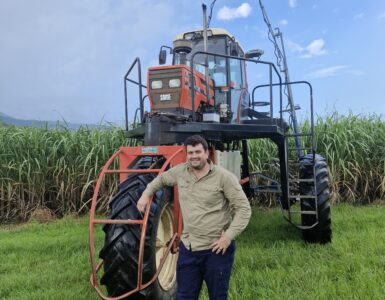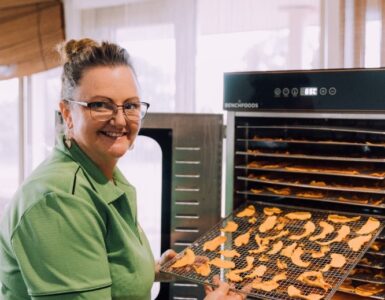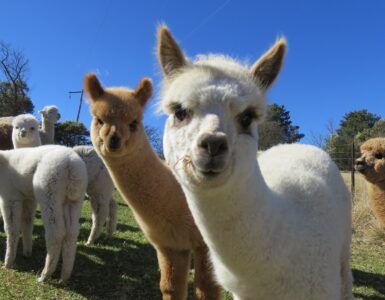Not all farm animals are soft like woolly sheep or docile like grazing cows. Some in fact, would eat you, if given the chance. Crocodile farming is not for the faint-hearted and Australian Farmers podcast host, Angie Asimus, caught up with the family who established Queensland’s first commercial crocodile farm in 1981.
Croc leather, meat and tours are growing in popularity. But this niche enterprise certainly has its challenges, from feeding 3000 reptiles to housing them. To learn more about the croc business, Lauren Lever of Koorana Crocodile Farm gives us a rare insight.

The farm has two elements – tourism and crocodile products. On the tourism side, visitors can see a nest, a breeding colony, as well as a stealth and ambush display.
This includes all crocodiles rescued from the wild.
“It’s not their fault they are brought to us, and we want to make sure they are as comfortable as possible and have social companions,” Lauren explains.
What to do if you find a crocodile nest
The family views the tours as a key educational tool. The best bit of information anyone can take away with them, is what to do if you stumble upon a nest in the wild.
Turn 180 degrees and run back the way you came from.”
“If you see a tree in the nesting area, the incubation period for her eggs is 85 days. So, she will sit at the bottom of your tree and wait for you.
“Also, never run in a direction you haven’t come from, because you may stumble into more nests. And never run towards water, that’s when they are their fastest.”

Safety first! Now, we’ve got that out of the way, Lauren is only too happy to share what being a crocodile farmer involves. She says, when you get to know them, they have very individual personalities from cheeky to aggressive and even lazy.
Crocodile instincts
“Their instinct is to bite anything that touches their head. Same as us with a fly. Our instinct is to swat it away,” she explains.
Visitors often remark on the rapport the family has with their crocodiles, which in turn, leads to questions about how they could harvest them for meat and leather.
“Yes, we love them. We want to work with them every day. But it’s also for conservation.
“I know that sounds a bit funny. How are we protecting the animals when we are turning them into burgers and handbags? Our answer is, we want to stop these guys being hunted in the wild.”
Once the human population decides it wants something, good luck trying to stop them from getting it, legally or illegally.”
Lauren believes farming crocodiles has reduced poaching and allowed numbers in the wild to grow.
“Yes, we are farmers. But our main goal is to show people these animals are beautiful. They need to be kept around.”
We don’t want to lose such an iconic creature to this country.”
The main market for crocodile leather is overseas in locations like France and Italy. Whereas, the meat is very popular domestically, especially in restaurants.
What does crocodile meat taste like?
“It’s a very delicate white meat. Poultry actually has a stronger taste. It can do anything chicken or seafood can do,” she explains.
The running costs of a crocodile farm may surprise you. Lauren says feeding chickens is more expensive!
These guys can go months without eating. If a male crocodile gorge-fed on a water buffalo, that animal could go 10 to 12 months without eating again.”
“They can go up to 3 months without drinking any water!”
The Koorana Crocodile Farm does offer food to its 3000 crocs twice every day.
“We like to think of ourselves as a meat recycling plant. If cattle die on the farm or on the way to the meat processing facility, they’re utilised here. The University in Rockhampton, their cafeteria offers us the leftover chicken carcasses,” she explains.
There are many examples of these deals with local businesses.
There are also some unique challenges specific to crocodile farming.
Koorana is one of the last Australian owned farms left in the country due to the highly competitive nature of the industry. Trying to find leather buyers is a work in progress, as is finding suitable staff to responsibly care for the thousands of reptilian residents.
“We need to make sure our staff are respectful to the animals but at the same time, don’t get injured themselves. We haven’t had a serious or fatal attack, and we want to keep that record!”
It takes months of training to be able to hand-feed the animals.
Famous faces
Here, the celebrities aren’t the handlers – they’re the crocodiles.
There have been some famous faces at the farm, one of those was 100-year-old Buka wo died in 2020.
He was taken into captivity from the wild, after some close calls with swimmers.
“He passed away from old age. It was a gut-wrenching loss to our family, and to his girlfriend. She was in mourning for a while having been together for over a decade. We didn’t want to bury him and forget him, so we did take his skin off his carcass and he’s up in our entertaining room.
“We wanted him close. A lot of our other family members who have passed away, crocodiles I mean, are up there too. I thought I better clarify that!”
We’re glad she did too.
Hear more stories like this by subscribing to the Telling Our Story podcast on iTunes (or wherever you listen to podcasts) and follow podcast host Angie Asimus on Instagram for more updates.






































Add comment